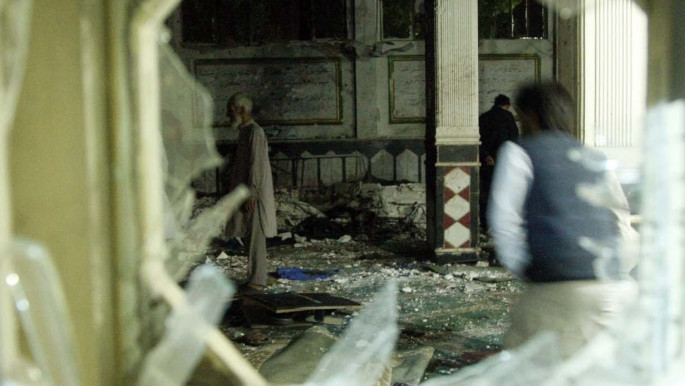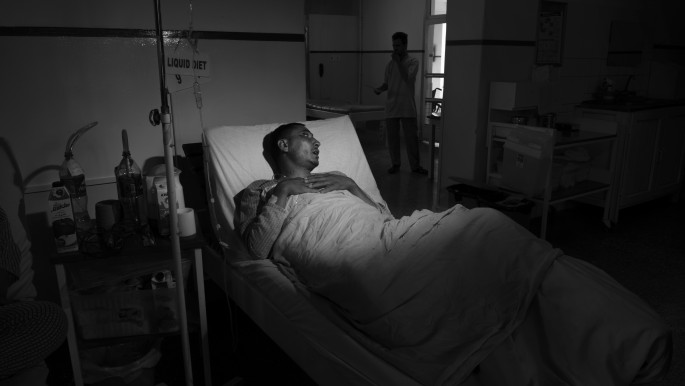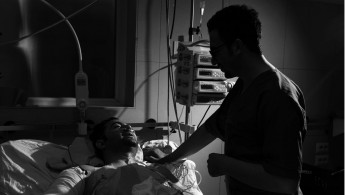The price of fear in Afghanistan
Hands, arms, feet or legs amputated. Eyes lost in an explosion, or vital organs torn by fiery shrapnel. A two-year-old child carries a bullet wound in her arm, shot in the mountains where the Taliban fight against government troops.
And in the past few months the situation here has only worsened.
There are two main reasons: US President Trump favouring a military over negotiation, and the fratricidal war between Taliban, the longest-standing anti-government group and the Khorasan Province (ISK), the local branch of the Islamic State group.
This fight is between the Taliban and their domestic extremism and the Islamic State group and its global agenda, borders that must be overwhelmed and ambitous targets. The result is the intensification of violence and military operations by anti-government groups - and ordinary people are, as ever, caught in the middle.
 |
The terror that can be read in the fearful and disoriented looks of the Afghans, like those working in the emergency hospital in Kabul |  |
In the past few months, the number of attacks have increased steeply.
The war here is often told by the numbers: From January to the end of March, there were 2,258 civilian casualties - 763 deaths and 1,495 injured - according to the UN Assistance Mission in Afghanistan.
UNAMA has also verified 23 "election-related security incidents" resulting in 271 civilian casualties - 86 deaths and 185 injured - the majority of whom were women and children.
Some attacks have been particularly bloody, like the targeting of the Intercontinental Hotel and the staff of Save the Children in January - and then the attack last May, when a truck bomb killed 150 people in the centre of Kabul, injuring hundreds more.
 |
|
| The scene after a suicide bomber hit a Shia mosque in western Herat province, Afghanistan, in August last year [Getty] |
Since then, the attacks have been frequent, hitting election registration centres, police stations, markets and shopping centres - leaving a trail of blood, death, and terror.
But while many choose to tell the story of the Afghan war through the numbers, the real stories are etched into the faces of the people, like those working in the emergency hospital in Kabul.
The hospital, a surgical centre for victims of war, has been open since 2001. Since then, it has treated 200,000 patients.
All rooms are full when we visit. Here are the wounded from the attack at the electoral registration centre, but also dozens of injured, collateral victims of the fighting between the Taliban and the Afghan army. Further rooms host dozens of people wounded by the explosion of a mine.
The smell of blood and the screams of pain from those whose skin has been burned by explosions is near-overwhelming. Doctors and nurses dart from one room to another trying to alleviate pain and assist the injured - particularly the many children here.
"The country has changed, there is no security. In the public offices, corruption is rampant," says Edhaiat, a surgeon who has worked here for 14 years.
"One of the reasons for my pain is that people have completely lost hope. Day by day people have lost trust that things can be better. They have - we all have - resigned.
"People want to escape. The best people in this country are leaving. I am still here for my family, but I'm paying a very high price for having decided to stay here in Afghanistan. The price is the fear."
Edhaiat seems older than his 38 years. It is, he says, the pressure of the job and the ever-present fear of death.
"My eyes have seen too much pain," he continues. "But every time a patient arrives without a leg or with his face unrecognisable due to burns, or with his abdomen open and his bowels pushed out by the shrapnel, my heart is destroyed again."
 |
Every person here has lost something or someone because of the violence in the country |  |
"I cannot get used to it. Every person we receive here is like a new wound in our soul."
Edhaiat walks along the corridors of the hospital. There are victims of recent attacks, such as 28-year-old Ali Khan Eshag, a social science student and tailor, who survived the April 22 electoral centre bombing.
"I was looking for one of the places where the electoral registration cards are distributed for the next election," he tells The New Arab, as he lays on his bed, his face covered with burns.
"Suddenly - an explosion - and I fell to the ground. I fainted for a while. When I opened my eyes, the first thing I saw was a child, screaming, and another child running through the corpses, screaming 'Mom, Mom'. Two or three policemen dead beside me and dozens of other bodies - men, women, and children still wearing school backpacks.
Twitter Post
|
"I studied social sciences, and we work as tailors to pay for my studies and thus improve our living conditions. My wife can neither read nor write, both of us are working to let me study. But now I do not believe anymore our life will be better."
In the intensive care room there are three children, survivors of the two attacks on May 30, in which nine journalists died.
Youssef, a nurse, says life in Kabul has completely changed even compared with ten years ago.
"We never feel safe. People would like to walk, drive, ride a bike, without being worried about dying. But this concern lives with us. Every person here has lost something or someone because of the violence in the country, be it suicide attacks, bullets, or a mine," he says.
"In the morning when I leave home, I say goodbye to my wife as if it were the last time."
Ten years ago, the hospital received an average of four gunshot victims a month, he says. Now the hospital receives between 10 and 15 patients every day.
"This war is like fog, because the limits of this war are not clear," he says.
Despite the billions of dollars spent by the United States in an attempt to defeat them, the Taliban are openly active across 70 percent of the country, according to a recent BBC study, controlling and threatening areas much more extensive than in 2014, when many foreign troops left the country.
People hit by stray bullets - even mortars - arrive daily to this hospital from areas where the Taliban fight with government forces, especially from Ghazni province.
 |
This is life in Afghanistan, your children are playing and suddenly a bullet comes and destroys your child's life, for no reason |  |
Muhammad Youssef is a farmer, father of Ansarullah, a two-year-old who was shot in Ghazni.
Muhammad is bending over his son's stretcher. He cries with his son, because he does not know how to relieve his child's pain.
"My wife and I were working, we are farmers, humble people, and our children were playing nearby the house. I went back to the house, I told my wife I was going to wash and I left the children playing football behind me," says Muhammad.
"Suddenly, while I was washing, I heard the shouts of my son, I opened the door and saw the child run into the corridor shouting. He did not have an arm. He no longer had his right arm.
The hospital, a surgical centre for victims of war, has been open since 2001 [Alessio Romenzi]
"This is life in Afghanistan, your children are playing and suddenly a bullet comes from the mountains - these mountains that are so beautiful and yet so dangerous - a bullet comes and destroys your child's life, for no reason. And you cannot do anything, you listen to him crying and look at the eyes of a child who has already become sad - and maybe they will remain sad forever.
"I will not forget the screams of a child with an arm detached by a bullet while playing football."
Mohammad cries and bends back over the stretcher. He caresses his son, Ansarullah, tells him that everything will be fine, and slowly wipes his tears.
Francesca Mannocchi is a journalist who previously reported from the front lines of the battle for Mosul and on the refugee crisis in Libya.
Follow her on Twitter: @mannocchia



